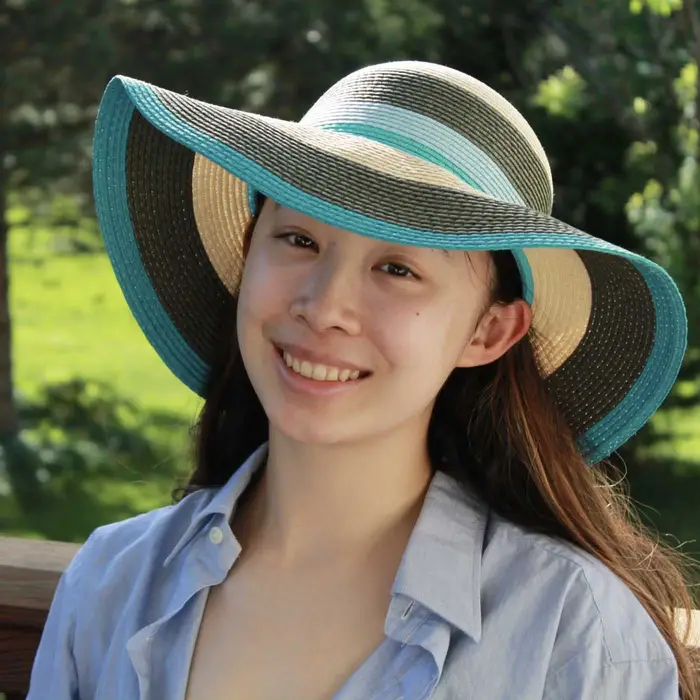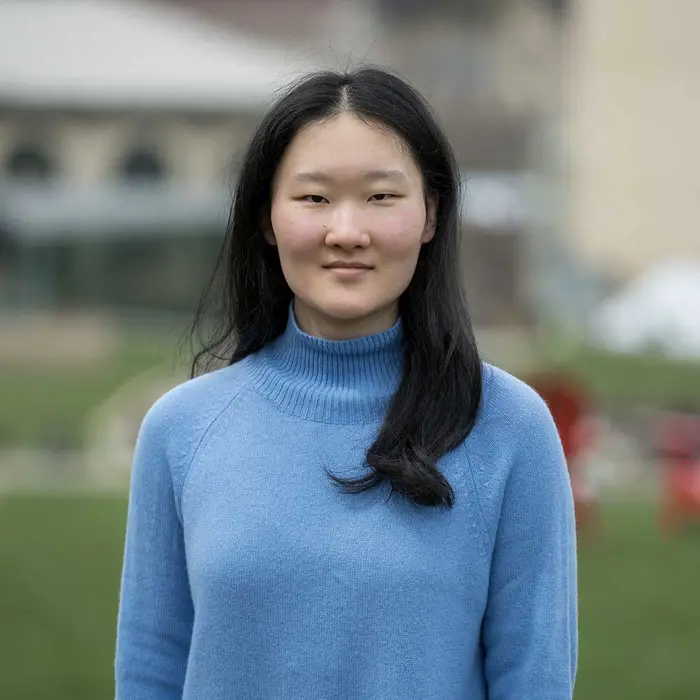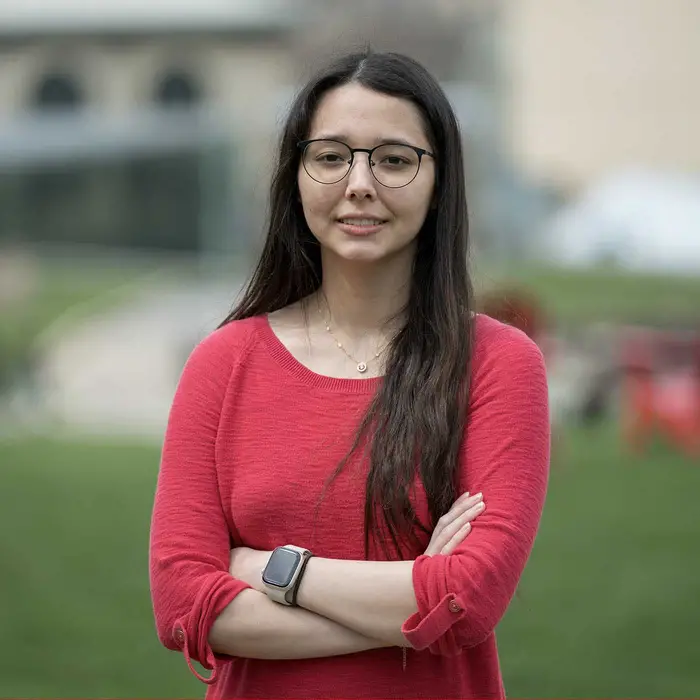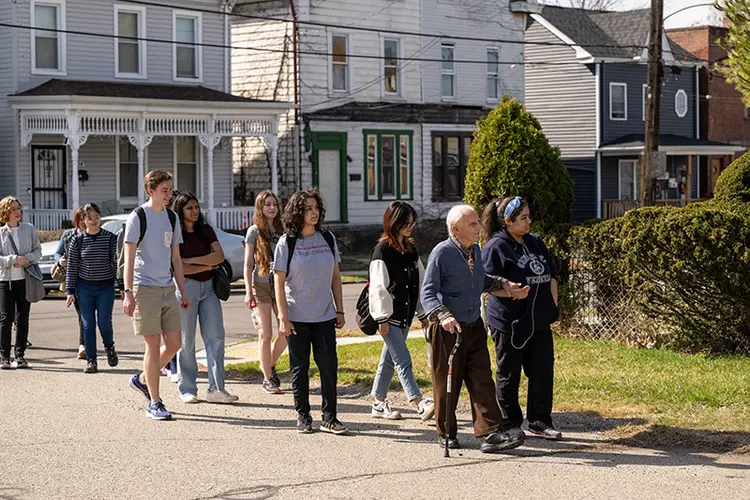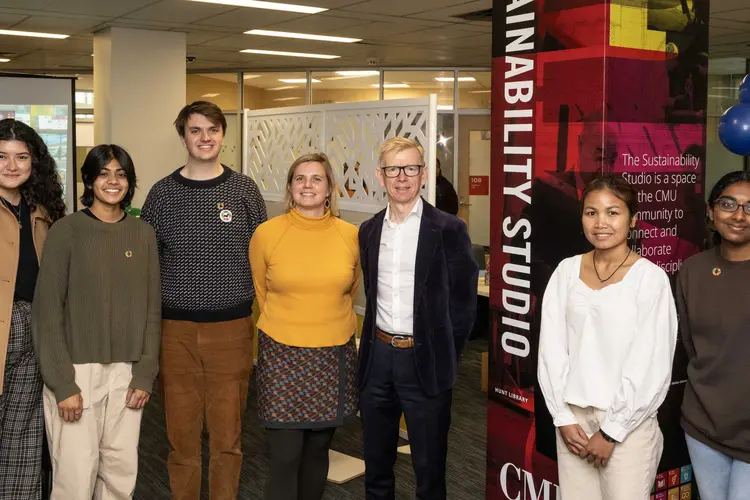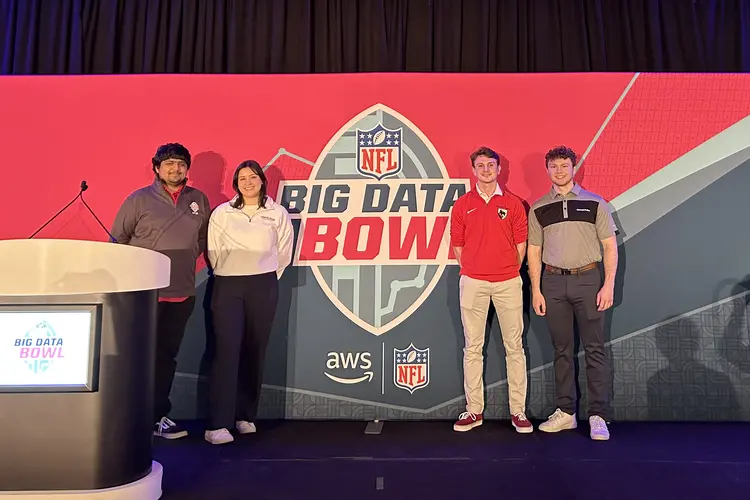Three CMU Students Awarded 2024 Goldwater Scholarship
Media Inquiries
Three Carnegie Mellon University students have been selected to receive the 2024 Barry Goldwater scholarship. The students — Claire Jin, Yunshu Li and Katherine Parry — were selected from a pool of more than 5,000 applicants for the federally endowed award, which provides coverage fees, books, room and board, and tuition up to $7,500.
The award from the Barry Goldwater Scholarship and Excellence in Education Foundation(opens in new window) is specifically awarded to sophomores or juniors who display academic rigor and a strong commitment to pursuing education in the natural sciences, engineering or mathematics. With the latest awardees, Carnegie Mellon has had a total of 51 students receive the scholarship since its inception.
“We are immensely proud of these three students,” said CMU President Farnam Jahanian(opens in new window). “It is wonderful to see Carnegie Mellon University’s roster of Goldwater Scholars grow and even more exciting to see our students recognized for their talents and hard work on the national stage. Congratulations to the winners from CMU — and to all the students who earned this distinction.”
Richelle Bernazzoli, director of the Office of Undergraduate Research and Scholar Development(opens in new window) (OURSD), celebrated the students’ continued success and commitment to scientific achievement and academic excellence.
“Claire, Yunshu and Katherine have already achieved so much in their fields, and the really exciting thing is that they are just getting started,” Bernazzoli said. “We greatly enjoyed getting to know them throughout the nomination process and we have been so impressed by the clarity of their goals and their dedication to their research areas. We can’t wait to see where their continued education and scholarship take them.
Claire Jin
Claire Jin wants to improve how generative artificial intelligence is incorporated into robotics.
More specifically, she wants to help create adaptable, reliable and transparent robotic systems that integrate with generative AI.
By incorporating physical intuition, situational awareness, and the ability to infer human intentions, Jin wants to improve how people interact with robots. Additionally, by improving model generalizability to a variety of tasks and interpretability, she aims to help users troubleshoot more easily.
The third-year student in the School of Computer Science(opens in new window) is working with the Connecting Language to Action and the World (CLAW) Lab(opens in new window) on how AI programs reason and converse when they collaborate with humans or other robots to perform tasks without a single solution.
“Knowing the caliber of previous scholars and their remarkable achievements in both industry and academia, I feel a sense of awe and gratitude,” Jin said. “It's an incredible honor to be recognized among such esteemed individuals, and I'm eager to contribute similarly with my future research.”
Jin, who will earn her bachelor’s degree in AI with an additional major in statistics in December, already has a great deal of experience working with large language models, and plans to pursue a Ph.D.
Her previous work includes using large language models for text-based game development and bug detection with Microsoft Research’s Natural Language Processing Group(opens in new window), refining multimodal models with its Knowledge and Language Team(opens in new window), and optimizing queueing strategies through reinforcement learning.
Jin began her research journey in high school, where she led a project under mentorship from Zita Oravecz(opens in new window) in the Department of Human Development and Family Studies(opens in new window) at Penn State University(opens in new window) on predicting stress onset in adolescents based on physiological signals collected using wearable devices. The work was later published in 2023 following reanalysis using deep learning methods Jin learned at CMU and presented at the IEEE-EMBS International Conference on Body Sensor Networks(opens in new window) with support from the Carnegie Mellon OURSD Presentation Award(opens in new window).
"I am deeply grateful for the pivotal role CMU's School of Computer Science has played in shaping my journey. Our school has provided me with so many enriching opportunities, from engaging in challenging classes to collaborating on projects with esteemed professors,” Jin said, noting the mentorship she received from academic and research advisers Reid Simmons(opens in new window), Weina Wang(opens in new window) and Yonatan Bisk(opens in new window), as well as professors Daniel Sleator(opens in new window), Daniel Anderson(opens in new window) and David Woodruff(opens in new window), to whom she has served as a teaching assistant.
“Their mentorship has not only fostered my academic growth but has also imparted valuable lessons that have shaped me into a more well-rounded individual,” Jin said.
Yunshu Li
Yunshu Li, a third-year physics student in the Mellon College of Science(opens in new window), is a Pittsburgh native whose academic research has spanned multiple fields at both Carnegie Mellon and the University of Pittsburgh.
Li received the Robert W. Kraemer Award(opens in new window) for her work as a first-year student. Her first research experience at CMU was in Stephanie Tristram-Nagle’s(opens in new window) experimental biophysics lab, where she studied novel antibiotic treatments for multidrug-resistant bacteria. She continued to make progress in the study of novel antimicrobials in the laboratory of Dr. Berthony Deslouches(opens in new window) at Pitt.
“One major takeaway I’ve had from all of the labs I’ve worked in is that they’ve taught me how to ask meaningful questions, design productive experiments to explore these questions, and disseminate information effectively to diverse audiences. I am incredibly grateful for all of the mentors that I’ve met during my time as an undergrad here at CMU. Working under the guidance of mentors who are both enthusiastic about research and leaders in their fields has greatly shaped my own passion for research,” Li added.
Currently, Li is conducting research into the effects of attention on different levels of the auditory processing pathway in the Lab in Multisensory Neuroscience(opens in new window) at CMU under the guidance of Barbara Shinn-Cunningham(opens in new window), Abigail Noyce(opens in new window) and Ph.D. candidate Victoria Figarola(opens in new window).
“An area of focus in the lab is on how our brains allow us to focus attention and suppress uninteresting sound in complex auditory environments, and what particularly excites me is the potential to leverage the insights we can gain from auditory neuroscience studies to aid individuals with hearing pathologies,” Li said. “What I’ve enjoyed the most about working in this lab is being able to use both behavioral and computational methods in combination with noninvasive neuroimaging techniques to assess brain function in human subjects.”
For Li, much of what motivates her inside of the lab also takes place outside of it. As an undergraduate teaching assistant in introductory physics courses for both majors and nonmajors, she was able to explore her passion for helping others learn the sciences in the lecture hall setting.
“I’ve really enjoyed my time as a teaching assistant,” Li said. “I think it’s taught me how to think about problems from different perspectives, and how to work on my communications skills so that I can most effectively engage with a broad range of students.”
Additionally, volunteering at UPMC Shadyside has influenced her research interests and bolstered her professional goals. In this volunteer position, Li works with elderly patients to help prevent hospital-acquired delirium. “Working directly with patients has been a formative experience for me which has solidified my commitment to pursuing a career that can integrate research with health care.”
All of this work, both in and outside the lab, has inspired Li to pursue a combined MD/Ph.D. in neuroscience after her undergraduate studies. “In the future, I see myself working as a physician-scientist who is seeing patients while also teaching and conducting research at an academic medical institution.”
Katherine Parry
Katherine Parry is a junior studying electrical and computer engineering(opens in new window) and physics.
“Katherine is amazing and beyond deserving of the Goldwater Scholarship,” said Larry Pileggi(opens in new window), the Coraluppi Head and Tanoto Professor of Electrical and Computer Engineering. “I was astonished by her passion and dedication to research. Her work is the caliber of that for a Ph.D. student, so I am excited to see the outcomes.”
“It is exciting to be recognized for my many years of intensive research,” said Parry. “I am glad to contribute to the prominence and recognition that Carnegie Mellon University and the College of Engineering deserve.”
Parry’s research focuses on designing faster computers through alternative approaches to computation.
“DNA sequencing, which results in new cures, and machine learning have only become feasible with faster computation,” explained Parry. “Interesting changes are being experienced as transistors are measured in 20-atom widths, and wire accounts for more delay than transistor gates. We're coming to the end of smaller circuitry. What will we do then? That is the answer I'm chasing.”
Parry is not a stranger to research. At the age of 16, she was working on a Mandelbrot generator for a science fair project. While focusing on increasing the processing speed, she discovered instances that had yet to be addressed.
“Mandelbrots are very square intensive, and I wanted to speed it up,” Parry explained. “I did some Googling and came across a couple of papers by T.C. Chen and R.H. Strandberg on how they cut the square computation in half by using Boolean logic to combine terms. However, I noticed some commonalities in the remaining elements that they hadn't addressed. I started playing around with the logic, and the elements got ugly and complicated. Tenacity is an important characteristic of a researcher. I persisted, and suddenly, I was looking at something incredibly beautiful. Those ugly computations suddenly simplified. The optimization of squares is measured in the number of additions required. The previous 16-bit squarer requires 35 adds; mine takes 29.”
As a homeschooled student in South Dakota, there were limited opportunities for Parry to discuss her findings with others. Turning to the internet, she came across a call for papers for the IEEE Symposium on Computational Arithmetic(opens in new window) (ARITH).
“I quickly did my best to write a research paper that was due soon. They would know if I had done something original. Their response was an invitation to speak to the world's leading computer researchers at their symposium in Kyoto, Japan. Because of that talk, I became part of their community, and even though they are all across the world, we correspond often. The talk also resulted in my first published paper.”
When it came time to apply to colleges, Carnegie Mellon was the clear choice in her mind.
“Not only does Carnegie Mellon have the most professors teaching computer design, but we have all the tools, and unheard of, we can tape-out computer chips,” explained Parry. “I have had several very famous researchers from the ARITH community envious of my CMU resources and ask to co-author papers so I can provide more credibility to their ideas. It wasn't by chance; I made a very informed decision in choosing CMU.”
As for her career goal, that is an easy decision, too.
“I want nothing more than to be a research professor at CMU,” says Parry. “I love doing research, and Carnegie Mellon University is a great place to do it.”
